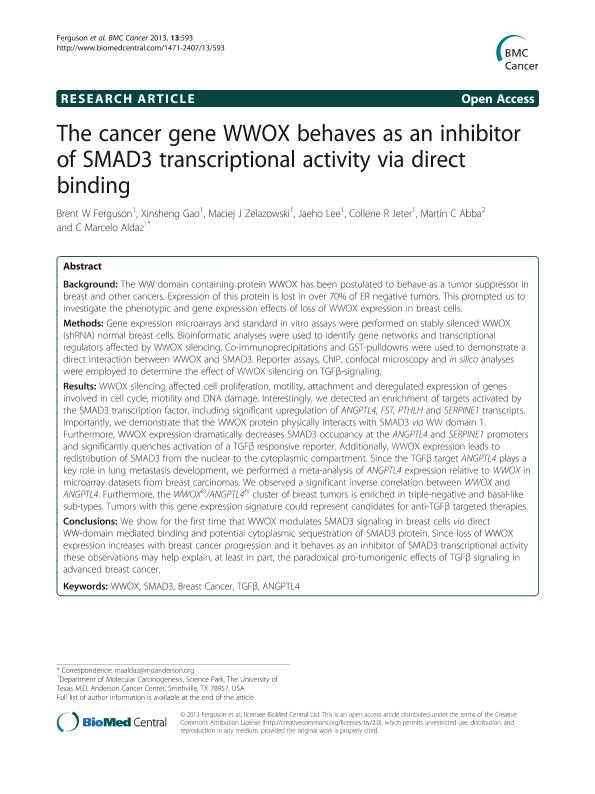Mostrar el registro sencillo del ítem
dc.contributor.author
Ferguson, Brent W.
dc.contributor.author
Gao, Xinsheng
dc.contributor.author
Zelazowski, Maciej J.
dc.contributor.author
Lee, Jaeho
dc.contributor.author
Jeter, Collene R.
dc.contributor.author
Abba, Martín Carlos

dc.contributor.author
Aldaz, Claudio Marcelo

dc.date.available
2017-10-10T17:15:29Z
dc.date.issued
2013-12
dc.identifier.citation
Ferguson, Brent W.; Gao, Xinsheng; Zelazowski, Maciej J.; Lee, Jaeho; Jeter, Collene R.; et al.; The cancer gene WWOX behaves as an inhibitor of SMAD3 transcriptional activity via direct binding; BioMed Central; BMC Cancer; 13; 12-2013; 1-11
dc.identifier.issn
1471-2407
dc.identifier.uri
http://hdl.handle.net/11336/26385
dc.description.abstract
Background: The WW domain containing protein WWOX has been postulated to behave as a tumor suppressor in breast and other cancers. Expression of this protein is lost in over 70% of ER negative tumors. This prompted us to investigate the phenotypic and gene expression effects of loss of WWOX expression in breast cells. Methods: Gene expression microarrays and standard in vitro assays were performed on stably silenced WWOX (shRNA) normal breast cells. Bioinformatic analyses were used to identify gene networks and transcriptional regulators affected by WWOX silencing. Co-immunoprecipitations and GST-pulldowns were used to demonstrate a direct interaction between WWOX and SMAD3. Reporter assays, ChIP, confocal microscopy and in silico analyses were employed to determine the effect of WWOX silencing on TGFβ-signaling. Results: WWOX silencing affected cell proliferation, motility, attachment and deregulated expression of genes involved in cell cycle, motility and DNA damage. Interestingly, we detected an enrichment of targets activated by the SMAD3 transcription factor, including significant upregulation of ANGPTL4, FST, PTHLH and SERPINE1 transcripts. Importantly, we demonstrate that the WWOX protein physically interacts with SMAD3 via WW domain 1. Furthermore, WWOX expression dramatically decreases SMAD3 occupancy at the ANGPTL4 and SERPINE1 promoters and significantly quenches activation of a TGFβ responsive reporter. Additionally, WWOX expression leads to redistribution of SMAD3 from the nuclear to the cytoplasmic compartment. Since the TGFβ target ANGPTL4 plays a key role in lung metastasis development, we performed a meta-analysis of ANGPTL4 expression relative to WWOX in microarray datasets from breast carcinomas. We observed a significant inverse correlation between WWOX and ANGPTL4. Furthermore, the WWOXlo/ANGPTL4hi cluster of breast tumors is enriched in triple-negative and basal-like sub-types. Tumors with this gene expression signature could represent candidates for anti-TGFβ targeted therapies. Conclusions: We show for the first time that WWOX modulates SMAD3 signaling in breast cells via direct WW-domain mediated binding and potential cytoplasmic sequestration of SMAD3 protein. Since loss of WWOX expression increases with breast cancer progression and it behaves as an inhibitor of SMAD3 transcriptional activity these observations may help explain, at least in part, the paradoxical pro-tumorigenic effects of TGFβ signaling in advanced breast cancer.
dc.format
application/pdf
dc.language.iso
eng
dc.publisher
BioMed Central

dc.rights
info:eu-repo/semantics/openAccess
dc.rights.uri
https://creativecommons.org/licenses/by-nc-sa/2.5/ar/
dc.subject
ANGPTL4
dc.subject
BREAST CANCER
dc.subject
SMAD3
dc.subject
TGFΒ
dc.subject
WWOX
dc.title
The cancer gene WWOX behaves as an inhibitor of SMAD3 transcriptional activity via direct binding
dc.type
info:eu-repo/semantics/article

dc.type
info:ar-repo/semantics/artículo
dc.type
info:eu-repo/semantics/publishedVersion

dc.date.updated
2015-03-13T19:23:03Z
dc.journal.volume
13
dc.journal.pagination
1-11
dc.journal.pais
Reino Unido

dc.journal.ciudad
Londres
dc.description.fil
Fil: Ferguson, Brent W.. University of Texas; Estados Unidos
dc.description.fil
Fil: Gao, Xinsheng. University of Texas; Estados Unidos
dc.description.fil
Fil: Zelazowski, Maciej J.. University of Texas; Estados Unidos
dc.description.fil
Fil: Lee, Jaeho. University of Texas; Estados Unidos
dc.description.fil
Fil: Jeter, Collene R.. University of Texas; Estados Unidos
dc.description.fil
Fil: Abba, Martín Carlos. Universidad Nacional de La Plata. Facultad de Ciencias Médicas. Centro de Investigaciones Inmunológicas Básicas y Aplicadas; Argentina. Consejo Nacional de Investigaciones Científicas y Técnicas; Argentina
dc.description.fil
Fil: Aldaz, Claudio Marcelo. University of Texas; Estados Unidos
dc.journal.title
BMC Cancer

dc.relation.alternativeid
info:eu-repo/semantics/altIdentifier/doi/http://dx.doi.org/10.1186/1471-2407-13-593
dc.relation.alternativeid
info:eu-repo/semantics/altIdentifier/url/https://bmccancer.biomedcentral.com/articles/10.1186/1471-2407-13-593
Archivos asociados
